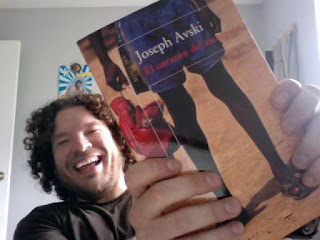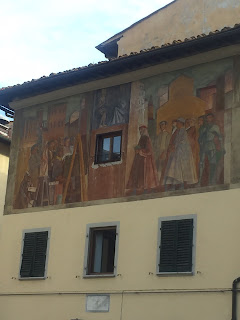Heart of Scorpio

José Palacios was a new grad student in our department when I met him in the summer of 2009. My immediate impression of him was that he was a super-nice guy. He came to A&M from Colombia via a Master of Fine Arts in Creative Writing from UT El Paso. What was most interesting, though, was that he had just written a novel that won a contest in his home country. Since I had been working on a novel myself for over a year that fact really grabbed me. Here was a guy who had accomplished what I was trying to do. I asked to read his novel and he graciously gave me a signed copy. And man, it was good – kind of a stream of consciousness like The Sound and the Fury where different speakers’ voices pop in and you as the reader kind of have to figure out who is talking. I offered to translate his novel, titled El corazón del scorpion from Spanish to English. It wasn’t very long – only about a hundred pages – and I wanted my mom, who is a great reader, to read what my classmate had published. He agreed under the condition that we share whatever we get from it if we were ever able to publish it. That’s an unusual arrangement since the translator of a work usually gets a very small percentage of the take from the publication of a translated work.
About 90% of the work was easy to translate. The book’s characters were mostly Afro-Caribbean and I heard in their voices in Spanish the same musicality of the voices I had heard growing up in central Louisiana, which makes sense when you realize that Cartagena, Colombia is closer to New Orleans than New Orleans is to Los Angeles. “Óscar ‘Mano de Ñame’ Manzur” became “Oscar ‘Hands of Yams’ Manzur” just like that. Same rhyme, same musicality, same rhythm, same meaning. Some parts were tough, though. The novel is about a black boxer, Colombia’s first world champion in anything, and race (as well as racism) is a prominent theme throughout the book. But there’s no “N-word” in Spanish. Negro is negro. So how did I know when to use the most offensive, hateful word in the English language? I just had to go by feel and context. I think I used it twice, once in an off-hand manner by a black guy referring to another black guy and another time when it was part of an entirely intentional offensive tirade by one character directed at the protagonist.
The process was fun and rewarding, though, and I fit the work in between my teaching, studying and writing time. The best part, though, was getting to know José better. There was something in me that recognized something joyful and radiant in him. He may be the smartest guy I know. He got his first master’s degree in Physics. He’ll pick up a math textbook and work through it just for fun. I’ve been in several graduate seminars in Hispanic Studies with him and when he starts talking about what authors he’s read and applying the theoretical threads he knows it makes me feel like I haven’t read anything. And the most amazing thing to me is that he’s accomplished all that coming from Montería, Colombia, the birthplace of the brutal Para-militaries in Colombia and the epicenter of much of the violence and kidnapping in that country over the past thirty years. In that way, José represents Latin America to me: dignified, joyful, capable people who rise up out of violence, corruption, and failed institutions; people who continue to reinforce for me what’s really important in life.
When we made the decision to translate the book Jose said, “Whatever comes out of this we share equally.” That was when it was just an idea. That was before Alfaguara, a Spanish publisher with extensive connections in Latin America, agreed to publish José’s book on a large scale (the book is arriving in bookstores in Bogota, Colombia this week). And that was before last week when José and I signed a contract with a company in Austin to publish the English version, Heart of Scorpio. So, however modest it turns out, our project appears to be taking off. Let’s hope so.


